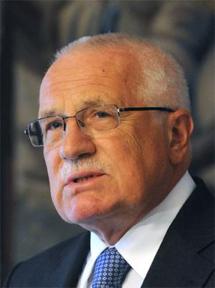EU leaders clear major hurdle to reform treaty
Lorne Cook
BRUSSELS, Lorne Cook - European Union leaders on Thursday cleared a major obstacle holding up the massive Lisbon reform treaty, paving the way for a new-look EU with its first-ever president.
At talks in Brussels, the leaders approved a proposal to satisfy a last-minute demand by the deeply eurosceptic Czech President Vaclav Klaus for his country to win an opt-out from the EU's charter of fundamental rights.

"The road to ratification stands open," said Reinfeldt, whose country holds the EU's rotating presidency, adding that the compromise will have no impact on the Czech Republic's neighbours.
The Czech Republic is the only one of the 27 EU nations that has not ratified the treaty.
"We have moved the last political obstacle to ratification," said European Commission President Jose Manuel Barroso, after a summit working dinner.
Klaus angered his EU partners when he sought an opt-out from the treaty three weeks ago, after Prague's parliament had already ratified it, in what his critics took as a fresh attempt to delay its adoption.
The move was to ensure the treaty will not allow ethnic Germans forced out of the former Czechoslovakia after World War II for Nazi collaboration to reclaim their property.
According to a European diplomat, the opt-out follows the same form as that accorded to Britain and Poland, whereby a protocol will be tacked on to a future EU treaty, probably when a new country joins.
The last technical obstacle remains a court appeal against the treaty by a group of Czech parliamentarians, many from the party Klaus founded. The Czech Constitutional Court is set to rule on it on November 3.
Czech Prime Minister Jan Fischer, who attended the summit, welcomed the agreement and said it paved the way for ratification in his country once the court has handed down its verdict.
"There will be nothing to prevent a fast completion of the ratification," he said. "The Czech Republic will ratify the treaty so that it could take effect by the end of the year."
A French diplomat, meanwhile, said the leaders would "reaffirm their determination to the see the Lisbon Treaty take effect by the end of the year," in a post-summit statement.
With the Czech problem out of the way, attention has also turned to candidates to become the first EU president, with former British premier Tony Blair a front-runner, along with Luxembourg Prime Minister Jean-Claude Juncker.
"We Britain, are supporting Tony Blair," British Prime Minister Gordon Brown said.
While no decisions on the new top job are expected, the leaders could reveal their level of ambition for the post if Blair, a charismatic and savvy orator, is dropped for a lesser light playing a more administrative role.
Leaders from Belgium, Hungary, Luxembourg and Spain suggested they would not back Blair, whose country is neither in the euro currency group nor the Schengen no-borders zone.
Other candidates include former Latvia president Vaira Vike-Freiberga, and ex-Irish premier John Bruton.
In the end, Reinfeldt said there was no point discussing names until all 27 nations had ratified the treaty.
Given the stalemate, he had insisted it was best to focus on the main topic of climate change, as the leaders seek agreement on how to share the costs of the battle against global warming.
Here too consensus has proved difficult, with less wealthy central and eastern European nations reluctant to stump up at the same rate as France, Germany and Italy to help the developing world -- and that trio reluctant to commit to hard figures.
----------------------------------------------------------------------------------------------------------------------------------